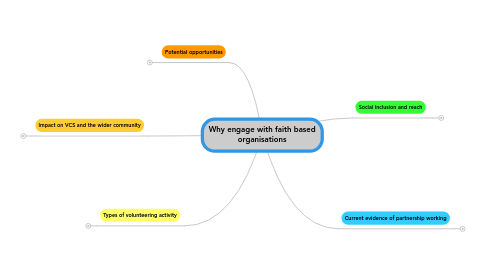
1. Types of volunteering activity
1.1. Volunteering and faith communities in England. Volunteering England. 2009 (See link: page 40)
1.1.1. Buddhist
1.1.1.1. promoting Buddist services to general public, ethnic heritage (e.g. Tibetan medicine)
1.1.2. Christian
1.1.2.1. Children, family, parenting, older persons, youth-work, housing, homelessness
1.1.3. Hindu
1.1.3.1. Translation/interpretation, older peoples services
1.1.4. Jewish
1.1.4.1. Community transport, older people, education, arts, leisure, sports
1.1.5. Muslim
1.1.5.1. Education, ethnic minorities, advice/information, women's issues
1.1.6. Sikh
1.1.6.1. Community kitchens, care of elderly, sports projects (young people)
2. Potential opportunities
2.1. FBOs have unprecedented levels of informal volunteers (See link: page 7)
2.2. FBOs often work under the radar (See link: page 1)
2.3. Untapped potential - mainstream VCS need to see FBOs as partners (See link: page 5)
3. Impact on VCS and the wider community
3.1. Voluntary action of FBOs spreads into secular society (See link: page 69)
3.2. FBOs are trusted by the local community (See link: page 6)
3.2.1. FBOs show commitment to goals of local VCS activity (See link: page 7)
3.3. FBOs are less at risk of losing their community focus than secular organisations (See link: page 6)
3.4. Networked FBOs have higher levels of social capital when partnered with VCS and public bodies (See link: page 7)
3.4.1. FBOs have 'bridging capital' (See link: page 1)
3.5. Community cohesions is effective when activity is led by the people (See link page 50)
4. Social inclusion and reach
4.1. Faith groups are among the most engaged sections of the community (See link: page 7)
4.2. 38% of FBOs (in Islington) sit on neighbourhood panels/bodies (See link: page 34)
4.3. A way of gaining access to 'hard-to-reach' communities to combat social exclusion (See link: page 71)
4.3.1. Engagement with BAME communities via Christian, Muslim and Sikh links (See link: page 32)
4.3.2. Immigrants are more likely to volunteer for FBOs (See link: page 3)
4.3.3. 38% of FBO's are in some way led/managed by person/persons from BME communities (See link: page 34)
4.3.4. Partnerships between FBOs and the wider voluntary sector bring local knowledge, skills and innovation to working with offenders (See link: page 5)
4.3.5. More than half of muslim students are involved in voluntary work (See link)
4.3.6. FBO services often recruit volunteers from amongst previous service users, developing further linkage through localised relations between the FBO and socially excluded people (See link: page 92)
4.4. Disadvantaged people are involved in helping themselves and others around them (See link: pages 47-48)
4.5. Partnerships promote social inclusion & failure to engage can compound social exclusion (See link: page 3)
4.5.1. Immigrants are less likely to be asked to volunteer by VCS secular organisations (See link: pages 4-5)
4.6. FBOs are connected to grass-roots, often in 'hard-to-reach' communities (See link: page 5)
5. Current evidence of partnership working
5.1. Evidence of significant cooperation between FBOs and local voluntary organisations (See link: page 12)
5.2. Secular VCS organisations partnering with FBOs report a greater scope of volunteer involvement (See link: page 2)
5.3. Current research available is too generic to identify 'enabling factors' (See link: page 8)
5.4. Partnerships between FBOs and secular VCS organisations are more likely to bring immigrants into contact with wider society (See link: page 4)
5.5. Partnerships between FBOs and the wider voluntary sector bring local knowledge, skills and innovation to working with offenders
5.5.1. (Also see link)
